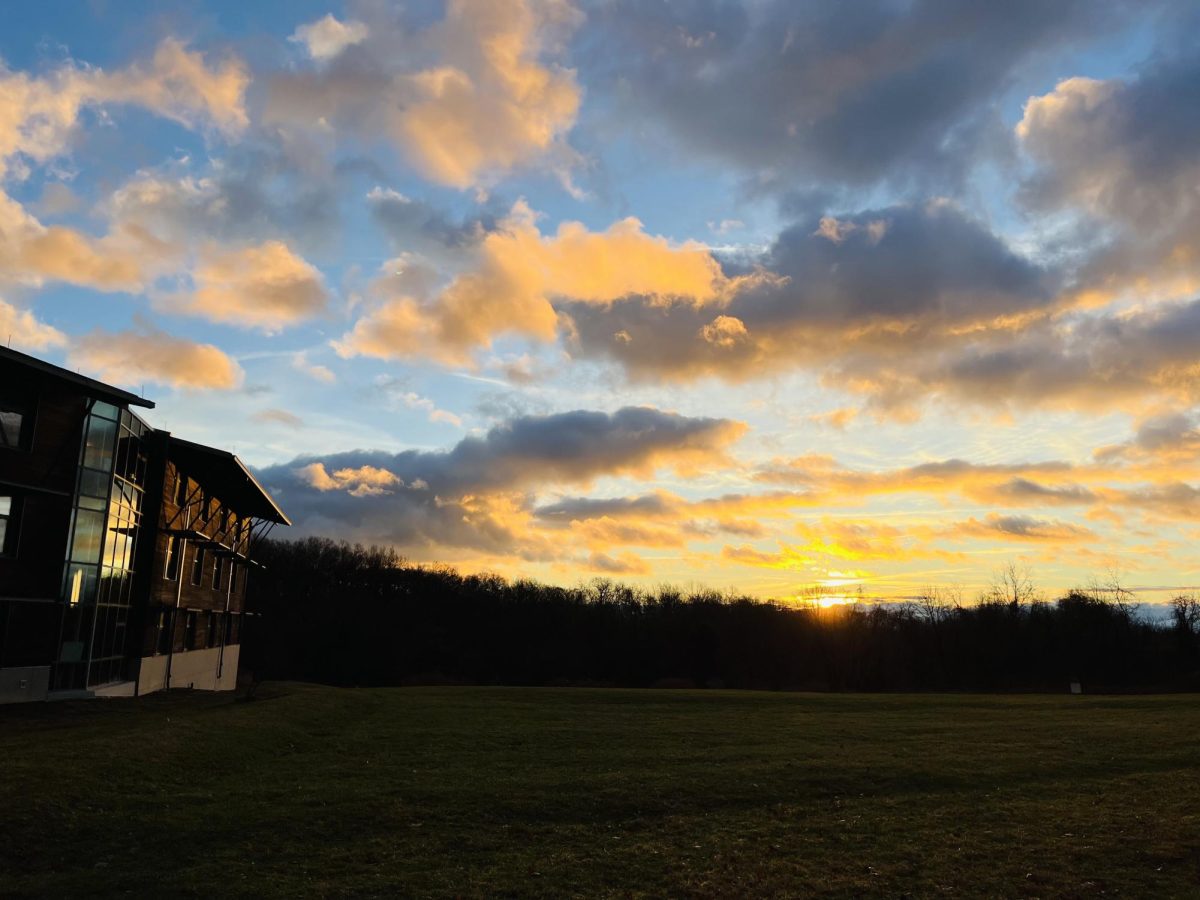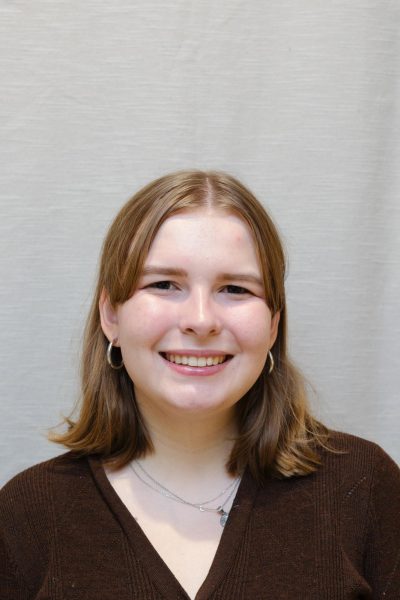Over the summer, Chatham University announced that Orchard Hall, the only residential building at Eden Hall, would close for the 2024-2025 academic year as a part of the University-wide reorganization. The Eden Hall campus in Gibsonia is around a 45-minute drive from the Shadyside campus, where prospective Orchard Hall residents were reassigned.
Bex Romer: Orchard Hall represents the value of sustainability; Chatham needs to respect it
As an incoming second-year sustainability student in the Falk School of Sustainability & Environment, I was told I would have the opportunity to immerse myself in the Orchard Hall community. Orchard Hall is the only residence on Chatham University’s Eden Hall campus and is a 45-minute drive north of the main Shadyside campus.
Orchard Hall was built for environmental science, sustainability and food studies students to experience the reality of living with geothermal systems and green infrastructure. Living in this environment exposes students to practical architecture, multipurpose solar panel usage and methods to access sustainably sourced materials.
I chose Chatham because of the unique experience of living at Orchard Hall and the enriching education Eden Hall would offer. Living in green architecture that I hope to create in the future is essential to understanding the benefits and setbacks of renewable energy production.
On July 1, Chatham announced Orchard Hall would close for the 24-25 academic year. To receive an email saying this would all be stripped away two months before school begins, after I had already joined the Living Learning Community which encouraged environmental outreach and research with my peers at Eden Hall and created my schedule for next year, was heartbreaking.
The Board of Trustees concluded that the University is losing money in maintaining a fully residential experience at Eden Hall. Due to the reorganization resolution, the administration found it necessary to close Orchard Hall for the 2024-2025 academic year to lower the deficit.
This decision to close Orchard Hall will cause more harm than good because it will hinder students’ overall program experience. This will simultaneously cause prospective students to question their decision and confidence in the University to keep their programs running.
Chatham prides itself on the Eden Hall campus and the vital services it provides. It is one of their most significant selling points as a school because there was no comparable program. Telling incoming and prospective students that Orchard Hall is closed is discouraging for the students and undermines one of the University’s core values: sustainability.
Chatham is a well-known environmental science university and is now losing a vital component, all while simultaneously displacing students, leaving some jobless and causing long commutes and school days with no individual space for us to decompress.
Such a drastic closure has me doubting the University’s priorities and dedication to the Falk School.
My peers and I should not be worried about the future of our programs and anticipating what will be cut next.
The financial deficit needs to be resolved, however, Chatham should not lose sight of its values in the process.
Marley McFarland: Closing Orchard Hall is an insult to Rachel Carson’s legacy
A quick glance at Chatham University’s website will tell you that Chatham lists sustainability and health as its first areas of excellence. A second will highlight alumna and esteemed environmental activist Rachel Carson, as well as name the school as one of the “greenest colleges in the United States.” One-third of the school’s mission statement emphasizes a goal “to live sustainably.”
These are the first impressions that Chatham is giving to prospective students, parents and community members. These were the core values that drew me to the school when I was a prospective student myself. As a second-year sustainability major, I am happy to say that I have not lost my passion for climate activism. However, I am simultaneously disappointed by the fact that the education which will allow me to pursue this passion is constantly on shaky ground.
Chatham’s primary outlet to maintain these aforementioned core values is undoubtedly the Eden Hall Campus. It is clear to anyone involved in the Falk School of Sustainability & Environment that the program would not be where it is today without the unique, immersive educational experience and community that Eden Hall provides.
During our second year as Falk School students, we are meant to be given the opportunity to fully immerse ourselves in the Eden Hall Campus by living in Orchard Hall, a Leadership in Energy and Environmental Design certified dorm building. Orchard Hall not only offers Falk School students a place to live at Eden Hall, but it provides us with the valuable and relevant experience of living in a green building.
By closing Orchard Hall, Chatham is diminishing the educational experience of all Falk School students. The sudden closure of Orchard Hall will require second-year Falk School students to continue to make the lengthy commute up to two times a day every weekday. This commute is not only inconvenient for students, but harmful to the environment as it promotes carbon emissions.
This extensive commute will also weaken the valuable connections students have with the farmland, professors and staff at Eden Hall. Faculty offices that were once a five-minute walk away from student housing now require a 45-minute shuttle ride with Falk students littered across leftover housing options on the Shadyside campus.
Chatham cannot market sustainability as one of its core values while simultaneously making such a stark divestment from the Falk School. The University continues to tokenize Rachel Carson in its marketing when it is clear that her legacy of environmentalism is no longer its top priority.
As a marine biologist, Carson stood for hands-on field experience, which is now much harder for students to experience without the existence of Orchard Hall. Nonetheless, Chatham continues to display Carson as the face of Chatham, both through our beloved mascot, Carson the Cougar, and the café that crowds of students filter in and out of every day, Café Rachel.
Chatham Students United (CSU) stands to advocate for the right for current students to live at Orchard Hall as promised. Moreover, it works to ensure that all future Falk School students will be able to reach their full potential and be given the opportunities that have been continuously marketed toward them in the admissions process and beyond.
With a sound list of demands for the administration at its core, CSU advocates for the protection of Orchard Hall through community outreach, peaceful protests and more. To contribute your unique skills and join the efforts of CSU, email chathamstudentsunited@gmail.com or talk to a peer in the Falk School at Eden Hall.
For Falk School students, this decision is so much bigger than Orchard Hall. If the dorm can be taken from Eden Hall so suddenly, who knows what will be taken from our campus next? If the Board of Trustees must make such shattering decisions about our educational experience, the least they owe us and the entire Chatham community is full honesty and transparency. On behalf of CSU, I believe that the publicization of meetings held by the Board of Trustees would be a major step in the right direction in the effort to include students in university-wide decisions.




D Christopher Romer • Sep 5, 2024 at 5:53 pm
A closed Orchard Hall at Eden Hall does bring concerns for it’s overall future. I believe CSU needs to get in writing from the University and or Board, if it does not have it already, what clear metric defines reopening the residence. Then focus attention on exceeding that metric. Access and encourage high schoolers seeking that full experience to come to the school so enrollment can increase. Market for your majors. Reach out to the students of lesser universities to come on over. Use your research skills to find schools with troubled programs in your major and give them hope. It is important that you have published the concerns of those who have been denied what was promised. To make a difference, you’ll need to make a plan that will achieve the goal and “get in the boat with those in charge, and row strong and in sync with them” to move efficiently towards the same goal. Beside researching the other programs collectively, preps you if the administration repeats it’s poor communication performance and you have to abandon ship. Very proud of the authors.